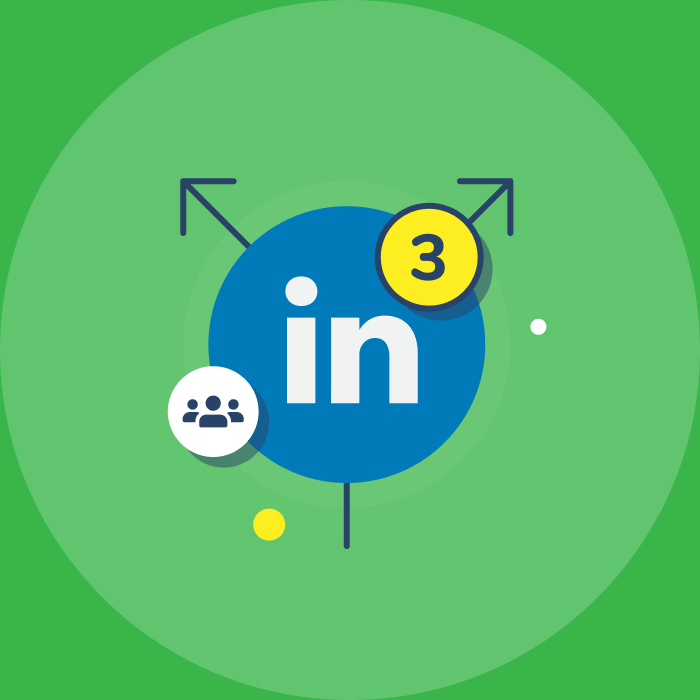LinkedIn is the largest professional networking in the world, but there are plenty of other networking options you can't miss out on. Here are 3 alternatives that can help you make meaningful connections.
While LinkedIn is often the first port of call for networking, there are other niche sites, communities, and platforms where you can build your professional profile and connect to others without getting lost in the noise.
As the COVID-19 pandemic continues, building professional rapport is more difficult than ever. While there are few face-to-face meetings, events, or conferences to attend, there are fewer opportunities to make meaningful connections through professional networking.
Fortunately, those of us who work in digital marketing or digital comms already possess many of the skills needed to move professional networking online.
Utilizing our digital skills
As a tech-savvy bunch, we already have experience using the digital tools we need to help us maintain and build relationships without having to meet, which gives us a huge physical advantage. We are likely to have a stronger digital professional footprint than most.
Being part of communities, contributing to forums and Q&A sites, posting on social media, writing and sharing content, and optimizing profiles and portfolios for ourselves and our clients have provided us with multiple opportunities to showcase our skills and allowed us to connect with like-minded individuals, as well as listening and learning from our peers.
So how else can we leverage these skills to build powerful professional networks online?
Think beyond LinkedIn
With over 700 million active users, there’s a good reason that the platform is an important space for networking. That being said, a recent study showed that very few LinkedIn users felt that their connections were useful in supporting or advancing their careers.
It’s tempting to accept requests from contacts researching you to connect. But quantity often results in less quality. Maintaining and nurturing professional networks becomes more difficult with lots of us having hundreds or even thousands of connections on LinkedIn. And let’s not get started on the daily spammy business development requests!
Suppose you’re serious about making meaningful connections on Linkedin. In that case, chances are, you’ll need to upgrade to a Premium account to get access to features such as increased profile searches and InMail messages, which allows for direct messages to be sent to another LinkedIn member that is not a connection.
Another issue is that if you have many connections, your feed will be dominated by posts that your loosely connected network likes, shares, or comments on. And they aren’t necessarily interesting or insightful.
We’ve all seen the ‘poetry’ style posts - a format that LinkedIn’s algorithm favors - plus plenty of humble brags, staged philanthropy, lies about smart things children have said, and sponsored posts cluttering our feeds.
Yes, it’s difficult to cut through the noise, but resorting to using these ‘engagement bait’ tactics to attempt to be heard above the noise isn’t a great long-term strategy. Your career is going to be a very long one. Don’t be ‘that’ person on LinkedIn.
LinkedIn Groups with open access to anyone have fallen to spammers, and there is little point in joining the vast majority of them as a result. Even those that require admin approval are full of users pushing promotional content, with very little discussion going on.
There are many ways that LinkedIn automation tools are still valuable for networking.
Followed hashtags are a good way of seeing what people are talking about and presenting opportunities to join in with discussions.
Asking for recommendations and endorsements from people you have worked with, as well as publishing articles and engaging with content posted by your connections, all help to keep things fresh and put you in front of mind.
Ultimately, investing in nurturing a handful of connections on LinkedIn is a better approach than focusing on pushing out ‘inspirational’ updates about ‘how you start your day with an hour of morning meditation’ followed by a plug for whatever you’re selling for vanity likes.
Seeking out networking alternatives to LinkedIn.
1. Video conferencing and private networking groups
Platforms like Zoom have seen exponential growth this year and have provided an invaluable method of connecting in a COVID era. Video conferencing platforms are great for keeping in touch with our teams and clients, ensuring that we don’t lose that personal connection you get from seeing each other, even if you can no longer meet in the same room.
Another way to use video conferencing platforms for networking purposes is to host and attend webinars and online events. They can also be utilized for more personalized and exclusive meetups.
Want to get a group of core contacts together? Virtual roundtables are a great way to chat in a more intimate and interactive way. Prepare some topics you’d like to gain insight into, and invite experts to share their knowledge.
Perhaps you’re missing breakfast and lunch meetings? Well, they can be done virtually. Some are using the incentive of providing vouchers for an online food delivery service such as JustEat to boost attendee numbers or as a way to thank clients and employees.
Membership organizations, such as the UK-based Chartered Institute of Public Relations (CIPR) organize monthly ‘DrinknLinks’ for members and non-members in its Greater London Group. More casual meetups like this are a great way of bringing people together to bond over a video chat and their tipple of choice.
Private and intimate professional networking using private messaging groups is a trend that seems to be gathering momentum during a time when physical meetups are difficult.
While it can be more challenging to be accepted into these groups, looking out for invitations and members you can reach out to is worthwhile. Think local marketing meetups that have migrated online or groups that focus on niche areas of marketing that you specialize in, and start making introductions. And if you can’t find any, why not start your own?
2. Online forums and communities
One of the oldest stalwarts of the internet, many have forgotten the power of forums in a social media era. Forums and communities are great places to share knowledge and get advice. Still, they also provide opportunities to network more meaningfully, as you don’t have to shout loud to beat the social media feed algorithms.
Being an active member in community forums builds trust and offers a platform for demonstrating expertise, making it a perfect environment for forging relationships. Those who build up their profiles in these spaces can be rewarded with kudos or actual rewards by the platform, boosting their credentials and professional presence.
Forums and communities are not the places to be overly promotional, and doing so may even result in a ban. Yes, you can link to an article you wrote on a topic if it is genuinely useful. Don’t respond to questions by offering to help out... for a cost.
Some take steps to protect their communities from spam by only allowing those who have built up a certain amount of expertise, trust, or clout before they can initiate a conversation, post a comment, or add links to external sources.
Reddit is a prime example of this, where users must build up a certain amount of Karma to be permitted to post or comment. This can be frustrating for new users, but the effort will eventually pay off if it means being able to join an active and engaged community.
Some forums and communities will have a vetting process in place to check the credentials of those applying to join, while others are invite-only. If you’re going to put in the effort to join more exclusive communities, make sure you have the time to be a regular contributor, or it will be time wasted.
3. Profile and portfolio pages
It’s sometimes easy to forget that much of what we post online is in a public forum - so keeping professional and personal life separate is always a good idea. That’s not to say your professional profile should be devoid of personality. Still, It’s unlikely that anyone will be interested in your Instagram feed of pictures of your cats from a professional standpoint.
Set personal accounts to private and point people toward professional accounts in your about me or bio sections if necessary. Be consistent across sites, using the same or similar wording, themes, hashtags, and photos to create a strong professional brand.
Most importantly, keep profiles and portfolios up to date, and link sites together. Nobody is impressed when they end up on a 404 page for an ancient blog you set up and forgot about or see an experience section that hasn’t been updated in years.
Make sure you check how you appear in search engines regularly to mop up anything that could have a negative impact on someone’s first impression of you. Don’t give them a reason to have second thoughts about reaching out to connect.
Learn to love online networking
When networking online, remember that just like a friendship, a professional relationship requires a strong introduction and constant nurturing to maintain a connection in a meaningful way. Like any relationship, If you take more than give, it’s doomed to fail.
While it may be difficult to meet in person for some time, connecting with key contacts in the digital world can still be just as effective when done correctly.
Subscribe to weekly updates
You’ll also receive some of our best posts today





